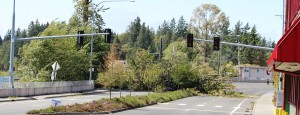It never hurts to be reminded and today Snohomish PUD sent out these reminders about Fall Storm Season…
Snohomish County PUD is ready, regardless of what the weather brings to the region in the coming months. Ahead of seasonal storms, the utility takes steps to be well-prepared and respond quickly to minimize any disruptions to its customers.PUD PRE-STORM READINESS
The utility’s storm preparations include the following key steps:
> Monitoring weather systems so all available personnel so they are ready to respond
> Securing contractors, when needed, to assist the PUD’s workforce
> Setting up potential mutual aid crews from other regional utilities
> Checking the PUD system, including critical transmission & distribution equipment
> Ensuring full stocks of critical materials, fuel and other supplies
> Coordinating with county emergency management personnel on regional response
CUSTOMER EMERGENCY KITS
A simple emergency kit can help customers be safe and more comfortable during power outages. Pack a kit with the following items: flashlights, batteries, matches, drinking water, food bars/prepared food, blankets, manual can opener, battery-powered clock and radio and first aid supplies. For kids, have books and games on hand for family fun.
WHO TO CALL
If you see a fallen power line, or a tree in a line, call the PUD at 425-783-1001. If it’s a life-threatening situation or medical emergency, call 911. During major storms, the PUD assigns additional staff to its Customer Service Center to handle customer questions.
STAYING INFORMED
Listen to local radio newscasts for the latest information about PUD storm response efforts. The utility shares information with KIRO-FM (97.3), KOMO-AM/FM (1000/97.7), KSER-FM (90.7), and KRKO-AM (1380). During major storms, look for posts on the PUD’s Facebook and Twitter accounts.
STAY AWAY FROM POWER LINES – Stay far away from any fallen power lines, including lines that are sagging or broken. Also, don’t cut up fallen trees that are entangled with power lines. The safe thing to do is assume that all power lines are alive and can be a killer if touched.
SPECIAL MEDICAL NEEDS
Customers using special medical equipment at home, such as respirators, should consider purchasing a back-up generator and/or have other contingency plans in place. They may want to make arrangements with friends, relatives or a local agency to transport them to an area where electricity is available. While the PUD strives to provide continuous electric service to customers, it cannot guarantee that occasional power outages won’t occur. During the winter months, the likelihood of power outages increases with storms.
TURN SWITCHES OFF – Try to remember what was turned on at the time the power went out and turn the switches to those items to the off position. It’s especially important to turn off anything that has a heating element, such as the electric range, an iron, or a toaster oven. Turning items off will prevent a fire when the power is restored and also help the PUD restore power faster.
UNPLUG ELECTRONICS – Unplug all electronic equipment, such as TVs, the microwave oven, computers, stereos, and the garage door opener. The process of restoring power could cause voltage fluctuations that might damage sensitive electronics.
USE A PORTABLE GENERATOR SAFELY – Never plug a portable generator into your household wiring unless your home is equipped with a transfer switch that was installed by a licensed electrician. Your generator could be damaged or, much worse, it could back feed electricity through the meter and out into the neighborhood, where it would cause a severe safety hazard to neighbors and line workers. If you need to power an appliance with a generator, plug it directly to the generator.
BE SAFE IN YOUR HOME – Always use extreme caution if you use candles or oil lamps. Never leave them unattended and keep them away from furniture, drapes, and other flammable materials. Also, make sure you have enough ventilation if you use a kerosene heater, a camp stove for cooking, or a portable generator.
PROTECT FOOD – Keep your refrigerator and freezer doors closed as much as possible. The contents should be good for at least 24 hours if the door is kept closed. After that, use dry ice for the protection of food.
BE COMFORTABLE – Choose a small room with few windows as your emergency living quarters. Keep the windows, drapes, and doors closed. Also, dress warmly. Wear several layers of clothes and don’t forget to wear a hat.





October 10, 2017
Everett